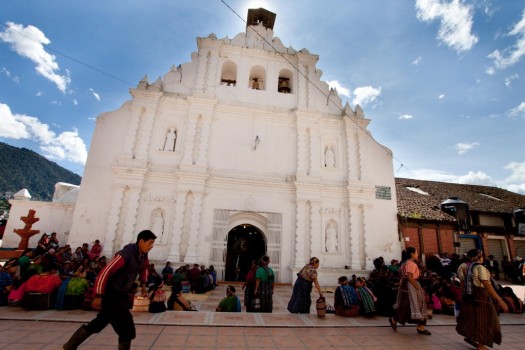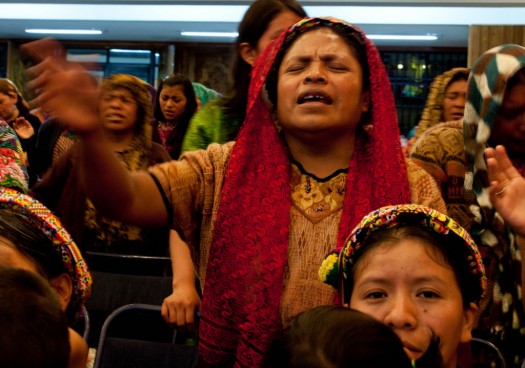
The Growing Evangelical Population in Latin America

Several Indigenous Mayan Guatemalans wait outside the Catholic Church in the town of Almolonga for the K’iche’ service, following the earlier Spanish service.
I have been living in a small town in Guatemala’s Highlands for the last few months, and fireworks at night are common. Yet around noon last Wednesday, I heard loud explosions and saw the tell-tale hanging smoke cloud indicating somebody was setting off rockets. As I walked to the center of town for lunch, I could hear the church bells ringing, and I wondered if there was some kind of emergency. Finally, the local family with whom I eat lunch told me we have a new Pope. My friend, Maria, beamed at the news. She told me all the Catholics were happy.
An hour later, I was at a café. Just to make conversation, I remarked to the young Guatemalan woman behind the counter that there was a new Pope. I was proud to be a bearer of big news. She wasn’t impressed. “Oh, new Pope?” she said, absently. A few seconds later, I heard her mention it to a co-worker in a tone you might use to say “The neighbors’ daughter is pregnant again.”
I realized then she was probably an Evangelical Protestant. To her, a new Pope wasn’t something to celebrate. It was just something that the Catholics were excited about. The town I live in is still majority Catholic, but there are at least a dozen Evangelical churches. The next town over is overwhelmingly Protestant. (The terms “Evangelical” and “Protestant” are used interchangeably in Guatemala, probably because nearly all Guatemalan Protestants are members of Evangelical churches).
I spent nearly two months reporting “The Soul of Guatemala”, a half-hour radio documentary that aired March 19th on American Public Media’s The Story With Dick Gordon. The documentary examines the growth of Evangelical churches in Guatemala following a major earthquake in the 1970s, and a brutal Civil War that displaced hundreds of thousands of people. One theme that I tried very hard to explore was the tension between Catholics and Evangelicals. Evangelical Christianity is growing in popularity throughout Latin America, and Guatemala is leading the trend, as nearly half of the population has converted from Catholicism to Evangelical Christianity in the last 30 years.
However, whenever I asked Guatemalans about the tension between Catholics and Evangelicals, nobody would talk about it openly. I always got the same answer, whether the speaker was Catholic or Evangelical: “We respect them, they respect us. We don’t say anything bad about them. They don’t say anything bad about us.” I heard it so many times that I stopped believing it.

An indigenous Mayan woman prays and sings during a fiery Evangelical Sermon at El Calvario Church
Yes, it’s true, in most places, Catholics and Evangelicals treat one another with a veneer of respect, and in some cases, I think the respect is sincere. But privately, many hold the other in some contempt. Many Evangelicals see Catholics as idolatrous and complacent, using a variety of Saints’ Days and festivals as excuses to drink and party. Many Catholics see Evangelicals as rule-bound, teetotalling squares who are fond of crying and falling over in church. As with many stereotypes, there are tiny grains of truth in these characterizations.
This division creates real political tension in many Guatemalan towns. I’ve heard of families in which the siblings no longer speak, or have made a truce wherein they NEVER speak about religion. I’ve heard about towns where Catholics or Evangelicals can’t get a job or don’t get civil services as fast as their counterparts. Most people tell you that Catholics and Evangelicals might greet one another in the streets, but they never spend time socially. Your friends are either one or the other.
In a country with many division and problems, the tension between Catholic and Evangelical is bound to have ill effects. I’ve heard Guatemalan community organizers complain that it’s nearly impossible to organize around any issue anymore because people are so divided. Many people think Evangelical leader Harold Caballeros, who I interviewed for the documentary, could help spearhead a serious reform movement to address the rampant corruption and fraud in Guatemala’s political system. He’s shown an ability to work with Catholics and others, but he’s also on record expressing contempt for Catholic and Mayan beliefs. I think many Evangelical leaders sincerely hoped that they might convert an overwhelming majority of Guatemalans to Protestantism. (They believe that if everybody truly lives out Evangelical Christian ideals, corruption, violence, and poverty will end). However, their conversion rate has tapered off recently, and with a new Argentine Pope signaling the Catholic Church will be paying more attention to Latin America, it seems unlikely Evangelicals will take over Guatemala. So if Evangelical leaders like Harold Caballeros are serious about reforming the country, they will need to address the low-level, but ever-present tension between Catholics and Protestants.
———
Support for Jesse Dukes’ research into Evangelical Protestantism in Guatemala was provided by The International Reporting Project and The Open Society Foundations. “The Soul of Guatemala” is part of PRX’s Global Stories Project.
About the author: Jesse Dukes is an independent writer and documentary maker. He studied radio at the Salt Institute for Documentary Studies, worked for With Good Reason at the Virginia Foundation for the Humanities, and is a principal at Big Shed Media. In 2011, his VQR essay “Consider the Lobstermen” was selected as one of Byliner’s 101 Spectacular Nonfiction Stories. He recently produced the radio documentary “The Great Moonshine Conspiracy,” which aired on APM’s The Story and public radio stations. He is a VQR Contributing Editor. Read more of his work at VQR.

